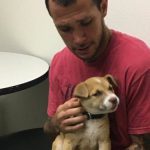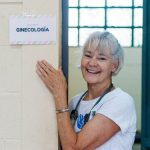By Janet Hendrickson, FNP-C
In 2014, I had an opportunity to spend one month living in Quetzeltenango (also known as Xela), Guatemala. The purpose of my trip was to study Spanish at Pop Wuj Spanish School. I chose this program because it offered one on one Spanish classes, living with a host family, and the opportunity to see patients at Pop Wuj’s medical clinic and in the community. At the time, I knew very little about Guatemala. I had never been to Central America and was excited to be adding another stamp in my near empty passport.
 Stateside, I was working as a primary care provider at Vista Family Health Center in Santa Rosa, California. One of the medical assistants I worked with was from Guatemala. He told me a lot about his country of origin. Knowing how much I love animals, he also warned me that there would be lots of street dogs and to be prepared.
Stateside, I was working as a primary care provider at Vista Family Health Center in Santa Rosa, California. One of the medical assistants I worked with was from Guatemala. He told me a lot about his country of origin. Knowing how much I love animals, he also warned me that there would be lots of street dogs and to be prepared.
While I knew street dogs all over the world live terrible lives filled with starvation, disease and often abuse, the reality of how these dogs lived their lives didn’t really impact me until I arrived in Guatemala. I remember looking out the window during one of my tutoring sessions and seeing several stray dogs running down the street. One of them was a “mama dog” who looked as if she had a litter of puppies somewhere. My heart broke. I thought about my dogs at home and how different their lives are. I also recognized that
Guatemala is a very poor country and doing the best it can. Yet, despite its poverty, it is a beautiful country and the people are wonderful and very welcoming.But a couple of questions kept running through my mind;
how can a country that relies on tourism as the main driver of economic growth really get ahead with stray dogs roaming the streets? How can people hold jobs when basic healthcare is not available?
According to the World Bank, during the last couple of years Guatemala has been one of the strongest economic performers in Latin America. However, while Guatemala is indeed the largest economy in Central America, it has one of the highest inequality rates in all of Latin America. It has some of the worst poverty, malnutrition, and maternal-child mortality rates in the region. Especially in rural and indigenous areas. The people and animals of Guatemala need outside help.
 During my initial stay, I along with other medical professionals and Spanish students were able to visit a nearby village and provide medical care. I was happy to be able to help. We rode a bus for over an hour to get to this village. As we drove I saw a lot of road kill. All dogs. I also saw a lot of stray dogs running near the road looking for food. As we pulled into the village, stray dogs were abundant. None of the dogs looked healthy. They were thin and several looked as though they had mange. All I could think was why can’t veterinarians be with us? We are here to help the villagers, but having mangy stray dogs running around certainly isn’t good for anyone’s health and wellbeing.
During my initial stay, I along with other medical professionals and Spanish students were able to visit a nearby village and provide medical care. I was happy to be able to help. We rode a bus for over an hour to get to this village. As we drove I saw a lot of road kill. All dogs. I also saw a lot of stray dogs running near the road looking for food. As we pulled into the village, stray dogs were abundant. None of the dogs looked healthy. They were thin and several looked as though they had mange. All I could think was why can’t veterinarians be with us? We are here to help the villagers, but having mangy stray dogs running around certainly isn’t good for anyone’s health and wellbeing.
My Spanish teacher understood my desire to do something so she connected me with Marketa Gregorovicova and Luis Aragon, founders of Colitas Felices (Happy Tails), a Guatemala based nonprofit organization dedicated to helping the street dogs of Xela. Marketa grew up in Czech Republic and Luis grew up in Xela. They met while working in the USA which meant they both speak English and that I could easily communicate with them.
We immediately bonded over our shared love of dogs and the need to try to help somehow. Over the past five years, I have worked with Colitas Felices to help the street dogs of Xela. One year, we even transported a few dogs back to Sonoma County because the Humane Society had empty cages and were able to help us find homes for them! Several of my friends have since adopted a dog from Guatemala. And of course, I cannot forget to mention my own Guatemalan dog Greta who hails from Xela.
My desire to help has endured and I have returned to Guatemala every year since my first trip. As we started People & Pets Project, I knew developing a program in Guatemala would be advancing the One Health mission, and I wanted to include this in our program efforts. Luckily the board of directors agree.
Through a recent lucky turn of events, I met Chelsea Glass, owner of The Heart of Travel, a boutique travel agency specializing in Latin America tours. She grew up in Sacramento but now resides in Antigua, Guatemala. Because of her help in connecting us with local physicians, veterinarians and others, we are embarking on a venture to meet with them to determine how to best set up a One Health Clinic in Alotenango, a village approximately 30 minutes outside of Antigua.
 So I pack my bags again and return to Guatemala, a country I have fallen in love with. But this time, I get to do so on behalf of People & Pets Project. We are lucky to have Chelsea Glass lead the way while we are there and the expertise and experience of Dr. Terry Paik and wife Marie who have set up and participated in numerous high-volume spay/neuter clinics in various parts of the world, including Mexico, Guam, Turkey and Chernobyl.
So I pack my bags again and return to Guatemala, a country I have fallen in love with. But this time, I get to do so on behalf of People & Pets Project. We are lucky to have Chelsea Glass lead the way while we are there and the expertise and experience of Dr. Terry Paik and wife Marie who have set up and participated in numerous high-volume spay/neuter clinics in various parts of the world, including Mexico, Guam, Turkey and Chernobyl.
Many ask why go to Guatemala to help when there is so much that needs to be done right here at home. True, we have lots of work to do to help people and their pets get the healthcare they deserve here. However, suffering knows no borders and neither should our compassion. The One Health Initiative is a local, national, and global movement. We have the opportunity to help where is it greatly needed, and a “border” should not prevent us from doing so. For so little, we can do so much and bring about real positive change. People & Pets Project is committed to helping locally, nationally and because we have the opportunity, internationally.
We are excited to be launching our first international One Health Clinic this fall where we can help the people and animals of Alotenango, Guatemala. We will be posting updates of our progress on our website and social media pages. So stay tuned and I hope you can join us on one of our upcoming trips!

As always, I welcome your thoughts and comments.



